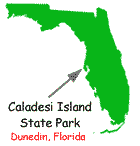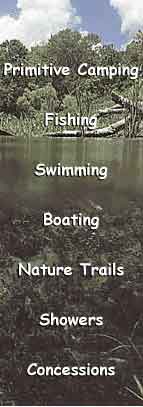|

Reservations for
Florida State
Parks are now
made through
Reserve America,
toll free, at
1-800-326-3521
|
CALADESI
ISLAND STATE PARK
For serenity and seclusion,
Caladesi Island State Park is ideal. Shore birds and sea turtles build
their nests undisturbed among the dunes. Gulf breezes ruffle the tresses
of auburn hairgrass. A beautiful island showcase, it
is one of the few remaining undeveloped barrier islands in the state.
The park is comprised of six islands
with a total of approximately 668 upland acres and more than2,500 acres
of surrounding mangroves and tidal flats and sea grass beds. Officials finalized
acquisition plans in 1968, then was opened to the public in 1972. Caladesi
Island was created in 1921 after a savage storm created Hurricane Pass and
separated it from what was then Hog Island. The origin of the name is uncertain,
however, it first appeared in print in the early '30's.
RESOURCES
Along the edge of the Gulf of Mexico, sand dunes line the open beach. Only
the hardiest plants can survive there -- sea oats, beach morning glory and
sea purslane. Turtles and birds find it an ideal location for nesting areas.
The coastal strand is host to several species of grasses and trees such
as palmetto, hercules club and sea grape. Periodic storm tides cover the
area, limiting the plant community's diversity. Flood and fire are constant
threats; however, two species call the coastal strand home -- the burrowing
gopher tortoise and its occasional roommate, the Eastern diamondback rattlesnake.
Farther in is the maritime
hammock, which provides a more stable environment because of higher elevation
and a relatively closed canopy. Live oak, red bay, sabal palm and Southern
red cedar thrive here, protected from salt spray and increased water evaporation.
The "high ground" of Caladesi is free from floods except under
extreme storm conditions. Slash pines dominate the open canopy forest
that contains an understory of wax myrtle and palmetto. Park staff keep
growth under control with ecological burns during the lightning season,
providing maintenance while minimizing danger.
Mangrove forests prevail on Caladesi's
eastern coast. One of the few trees that thrives in salt water, there are
three species that shelter the island and nurture many of its animal residents.
Given time, the mangrove roots trap additional soil and actually add to
the island's size.

Overnight docking
is permitted in the bayside
marina, but boaters must register before sundown. |
ACTIVITIES
Fishing, shelling and nature studies are ways to enjoy a visit to Caladesi.
Boaters can enjoy day use or overnight stays in the 108 slip bayside marina,
or in calm weather, anchor offshore. There is no camping on the island.
Picnic pavilions, bath houses
and a park concession provide additional amenities that make a visit to
Caladesi more enjoyable. Some facilities and activities are accessible to
the handicapped. Beach wheel chairs are available for visitors with physical
limitations.
FERRY SERVICE
Ferry service is available from the mainland, weather permitting. The ferry
departs hourly. For additional ferry information call (727) 734-5263.

For more information on Caladesi
Island State Park, write to:
Caladesi Island State Park
c/o Honeymoon Island Administration
# 1 Causeway Blvd.
Dunedin, FL 34698
or call (727) 469-5918
or visit www.floridastateparks.org/caladesiisland/default.asp
View Larger Map
|
|



